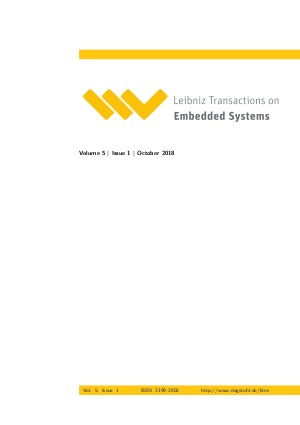Leibniz Transactions on Embedded Systems, Volume 5, Issue 1
LITES, Volume 5, Issue 1
-
Part of:
Volume:
LITES, Volume 5
Journal: Leibniz Transactions on Embedded Systems (LITES)

Publication Details
- published at: 2018-05-30
- Publisher: Schloss Dagstuhl – Leibniz-Zentrum für Informatik
- DBLP: db/journals/lites/lites5
Access Numbers
- Detailed Access Statistics available here
-
Total Document Accesses (updated on a weekly basis):
0PDF Downloads
Documents
LITES, Volume 5, Issue 1
Abstract
Cite as
LITES, Volume 5, Issue 1, pp. 1-134, Schloss Dagstuhl – Leibniz-Zentrum für Informatik (2018)
Copy BibTex To Clipboard
@Article{LITES-v005-i001,
title = {{LITES, Volume 5, Issue 1}},
journal = {Leibniz Transactions on Embedded Systems},
pages = {1--134},
ISSN = {2199-2002},
year = {2018},
volume = {5},
number = {1},
publisher = {Schloss Dagstuhl -- Leibniz-Zentrum f{\"u}r Informatik},
address = {Dagstuhl, Germany},
URL = {https://drops.dagstuhl.de/entities/document/10.4230/LITES-v005-i001},
doi = {10.4230/LITES-v005-i001},
annote = {Keywords: LITES, Volume 5, Issue 1}
}
Risk-Aware Scheduling of Dual Criticality Job Systems Using Demand Distributions
Abstract
Cite as
Bader Naim Alahmad and Sathish Gopalakrishnan. Risk-Aware Scheduling of Dual Criticality Job Systems Using Demand Distributions. In LITES, Volume 5, Issue 1 (2018). Leibniz Transactions on Embedded Systems, Volume 5, Issue 1, pp. 01:1-01:30, Schloss Dagstuhl – Leibniz-Zentrum für Informatik (2018)
Copy BibTex To Clipboard
@Article{alahmad_et_al:LITES-v005-i001-a001,
author = {Alahmad, Bader Naim and Gopalakrishnan, Sathish},
title = {{Risk-Aware Scheduling of Dual Criticality Job Systems Using Demand Distributions}},
journal = {Leibniz Transactions on Embedded Systems},
pages = {01:1--01:30},
ISSN = {2199-2002},
year = {2018},
volume = {5},
number = {1},
publisher = {Schloss Dagstuhl -- Leibniz-Zentrum f{\"u}r Informatik},
address = {Dagstuhl, Germany},
URL = {https://drops.dagstuhl.de/entities/document/10.4230/LITES-v005-i001-a001},
URN = {urn:nbn:de:0030-drops-192720},
doi = {10.4230/LITES-v005-i001-a001},
annote = {Keywords: Mixed criticalities, Probability distribution, Real time systems, Scheduling, Chance constrained Markov decision process, Linear programming, Randomized policy}
}
Errata for Three Papers (2004-05) on Fixed-Priority Scheduling with Self-Suspensions
Abstract
Cite as
Konstantinos Bletsas, Neil C. Audsley, Wen-Hung Huang, Jian-Jia Chen, and Geoffrey Nelissen. Errata for Three Papers (2004-05) on Fixed-Priority Scheduling with Self-Suspensions. In LITES, Volume 5, Issue 1 (2018). Leibniz Transactions on Embedded Systems, Volume 5, Issue 1, pp. 02:1-02:20, Schloss Dagstuhl – Leibniz-Zentrum für Informatik (2018)
Copy BibTex To Clipboard
@Article{bletsas_et_al:LITES-v005-i001-a002,
author = {Bletsas, Konstantinos and Audsley, Neil C. and Huang, Wen-Hung and Chen, Jian-Jia and Nelissen, Geoffrey},
title = {{Errata for Three Papers (2004-05) on Fixed-Priority Scheduling with Self-Suspensions}},
journal = {Leibniz Transactions on Embedded Systems},
pages = {02:1--02:20},
ISSN = {2199-2002},
year = {2018},
volume = {5},
number = {1},
publisher = {Schloss Dagstuhl -- Leibniz-Zentrum f{\"u}r Informatik},
address = {Dagstuhl, Germany},
URL = {https://drops.dagstuhl.de/entities/document/10.4230/LITES-v005-i001-a002},
URN = {urn:nbn:de:0030-drops-192736},
doi = {10.4230/LITES-v005-i001-a002},
annote = {Keywords: real-time, scheduling, self-suspension, worst-case response time analysis}
}
The Semantic Foundations and a Landscape of Cache-Persistence Analyses
Abstract
Cite as
Jan Reineke. The Semantic Foundations and a Landscape of Cache-Persistence Analyses. In LITES, Volume 5, Issue 1 (2018). Leibniz Transactions on Embedded Systems, Volume 5, Issue 1, pp. 03:1-03:52, Schloss Dagstuhl – Leibniz-Zentrum für Informatik (2018)
Copy BibTex To Clipboard
@Article{reineke:LITES-v005-i001-a003,
author = {Reineke, Jan},
title = {{The Semantic Foundations and a Landscape of Cache-Persistence Analyses}},
journal = {Leibniz Transactions on Embedded Systems},
pages = {03:1--03:52},
ISSN = {2199-2002},
year = {2018},
volume = {5},
number = {1},
publisher = {Schloss Dagstuhl -- Leibniz-Zentrum f{\"u}r Informatik},
address = {Dagstuhl, Germany},
URL = {https://drops.dagstuhl.de/entities/document/10.4230/LITES-v005-i001-a003},
URN = {urn:nbn:de:0030-drops-192748},
doi = {10.4230/LITES-v005-i001-a003},
annote = {Keywords: caches, persistence analysis, WCET analysis}
}
A Static Analysis for the Minimization of Voters in Fault-Tolerant Circuits
Abstract
Cite as
Dmitry Burlyaev, Pascal Fradet, and Alain Girault. A Static Analysis for the Minimization of Voters in Fault-Tolerant Circuits. In LITES, Volume 5, Issue 1 (2018). Leibniz Transactions on Embedded Systems, Volume 5, Issue 1, pp. 04:1-04:26, Schloss Dagstuhl – Leibniz-Zentrum für Informatik (2018)
Copy BibTex To Clipboard
@Article{burlyaev_et_al:LITES-v005-i001-a004,
author = {Burlyaev, Dmitry and Fradet, Pascal and Girault, Alain},
title = {{A Static Analysis for the Minimization of Voters in Fault-Tolerant Circuits}},
journal = {Leibniz Transactions on Embedded Systems},
pages = {04:1--04:26},
ISSN = {2199-2002},
year = {2018},
volume = {5},
number = {1},
publisher = {Schloss Dagstuhl -- Leibniz-Zentrum f{\"u}r Informatik},
address = {Dagstuhl, Germany},
URL = {https://drops.dagstuhl.de/entities/document/10.4230/LITES-v005-i001-a004},
URN = {urn:nbn:de:0030-drops-192753},
doi = {10.4230/LITES-v005-i001-a004},
annote = {Keywords: Digital Circuits, Fault-tolerance, Optimization, Static Analysis, Triple Modular Redundancy}
}